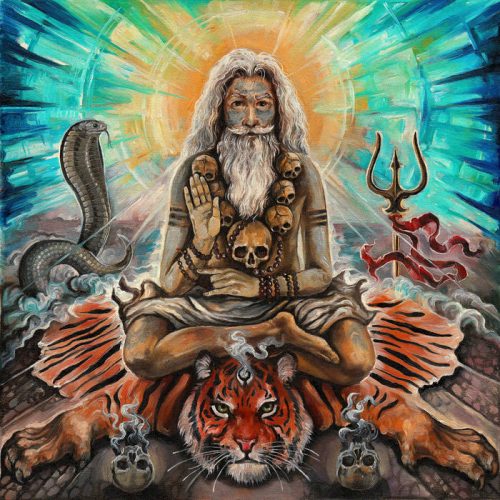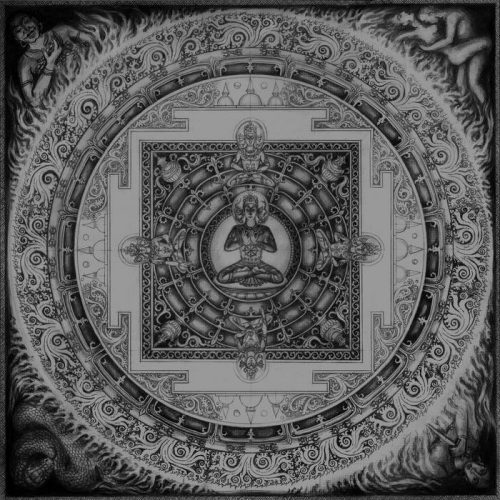
(This is Andy Synn‘s review of the new double-album by the one-of-a-kind Czech band Cult of Fire, which has been released today.)
Czech Black Metal collective Cult of Fire have never been ones to follow the stereotypical path.
Whereas much, if not most, Black Metal styles itself as adversarial – not surprising considering the genre’s rebellious roots – Cult of Fire have always seem less concerned with pushing back against the outside world and more focussed on exploring their own inner world, taking instead their inspiration from Buddhist teachings and Vedic mysticism.
In their own way, of course, this makes them just as iconoclastic as the most rabidly anti-Christian of tremolo-abusers, except that instead of seeking to define themselves by what they’re against, Cult of Fire seek only to define (or redefine) who they are, their true spiritual selves.
Perhaps it shouldn’t be surprising then that the band’s latest musical exploration (released digitally today, with a physical release following next month) comprises a double-disc duology of scorching sounds and meditative moodscapes, as we all know that the search for wisdom is both endless and eternal, and knows no bounds.

Moksha, the first disc in the pair, was inspired by the story and teachings of Baba Keenaram, the 17th century founder of Aghori asceticism, and features, in the band’s own words, meditations on “the most harsh suffering in everyday life” as a way of finding “deep and genuine understanding… of what lies buried in our bodies, in the depths of us as real beings.”
Clearly this isn’t your typical Satanic schlock.
Tracks like extravagant opener “Zrození výjimečného” and its darker, doomier companion, “Město mrtvých”, only serve to further reinforce this impression that Cult of Fire are operating on a different wavelength to the rest of their peers.
Of course, the basic elements – the buzzing, tremolo guitars, the rapid, bone-rattling percussion, the savage, cathartic vocals – still root the band firmly in the musical traditions of Black Metal, but their more progressive proclivities and epic inclinations, from their use of unexpectedly morose and melodic riffs to their heavy use of atmosphere-enhancing keys and hypnotic chanting, ensure that the band’s sound frequently diverges down a very different path.
But while those looking for simplicity would perhaps be better off looking elsewhere, that’s not to say that songs such as “(ne)Čistý” and “Har Har Mahadev” are in any way lacking in pure fire and fury. Although, that being said, the latter also showcases some of the more esoteric and unusual elements of the band’s sound, replete with passages of mesmerising minimalism and magnetic, mantra-like hooks.
Concluding with the brooding, blistering strains of “Mokša”, this is most definitely an album which demands repeat listens to fully appreciate all that it has to offer.
But, as the band themselves would no doubt agree, it takes many cycles to reach enlightenment.

The second half of this pair – comprising five tracks dedicated to attaining true knowledge of the five afflicted emotions (desire, anger, delusion or ignorance, pride and jealousy) and transforming them into wisdom – is darker, weirder, and, arguably, even more introspective than its predecessor.
From the sombre slow-burn of “Buddha 1” – which concludes with a strangely vibrant blend of bewitching blackened energy and entrancing vocal intonations – to the dynamic mix of fearless bombast and soothing calm which makes up “Buddha 5”, Nirvana both demands and rewards the listener’s full immersion.
And yet, despite this, it’s not a demanding listen. Nor does it ever feel as though it’s trying to impress its audience or prove anything to anyone else. It simply focuses on being, existing from moment to moment, entirely on its own terms.
This is particularly noticeable on “Buddha 3”, which is perhaps both the proggiest, most melodic, yet at times most savage, track on the entire disc. Although, truth be told, the entirety of Nirvana feels similarly free and fluid when it comes to songwriting, every song proceeding at its own pace, making its own mark, while also speaking with one united voice.
Of the two discs which make up this set, this is most certainly my favourite. For whatever reason it just connects with me on a deeper level than its predecessor.
Yet the truth is that the set is best heard, best digested, as a pair, one whose duality, and similarities, collectively provide an even more engaging and enlightening experience when taken together than they ever would alone.

I have been intrigued by Cult of Fire ever since I first heard Čtvrtá symfonie ohně, and specifically, the amazing Vltava. And despite the lack of Satanic imagery and focus here, I actually find Cult of Fire to be very similar, in terms of experimentation and boldness of artistic vision, to fellow Czech black metallers, Root. This was a great review!
At least on my side of the Atlantic, Root are far too unknown and under-appreciated. And I understand your comparison. They are also very individualistic and compelling.
Root DO have a magic bowl though. Not sure if CoF can say the same.
Los conocí luego de asistir a Batushka en santiago de chile, un amigo me los recomendó y desde ahi se han transformado en una de mis bandas favoritas, ademas los conoci a tiempo para ir a verlos en vivo ese mismo año 2018.
Suelo empatizar mucho con la sabiduría hindú y ademas un amante del black metal, por lo que Cult of fire me llena de una forma especial.
Moksa y Buda 3
I am disappointed that the Cult’s weird Slavic obsession with Indian/Hindu/Buddhist themes never goes checked in reviews as orientalism (depicting aghori babas and such and hilarious use of Hindi song titles instead of sanskrit). While still cringey at times, I appreciate Aki Cederberg’s take on Hindu ritualism/belief…Cult Of Fire just seem content with making not bad but cleanly produced, generic black metal and hiding behind saffron cosplay/marketing shtick and the occasional sitar solo. Maybe they’re genuine about their belief but damn is it tiresome. Beatles anyone?